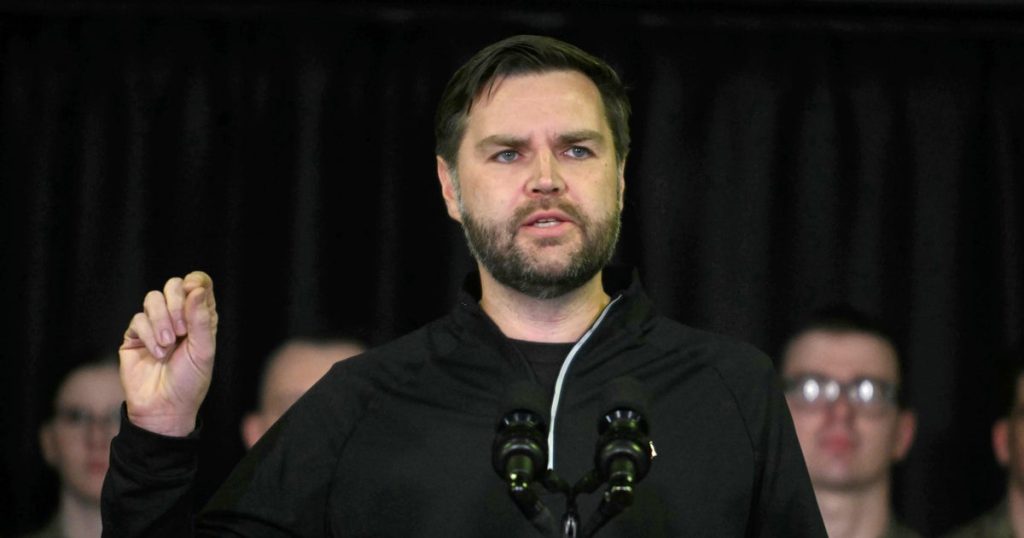During a recent visit to Los Angeles, Vice President JD Vance affirmed the Trump administration’s stance on the necessity of military deployment in response to ongoing protests related to Immigration and Customs Enforcement (ICE) activities. This visit marks a significant moment as Vance is the highest-ranking official from the Trump administration to engage with local law enforcement since protests erupted in the region. As tensions continue over federal immigration policies, the administration is actively pursuing military involvement as a means of asserting control.
| Article Subheadings |
|---|
| 1) Vice President’s Visit and Statements |
| 2) Federal Laws and State Resistance |
| 3) Controversy Surrounding Military Presence |
| 4) Escalating Federal Enforcement and Arrest Rates |
| 5) Political Dynamics and Responses |
Vice President’s Visit and Statements
Vice President JD Vance visited Los Angeles, where he met with federal law enforcement officials to assess the ongoing situation regarding ICE raids and subsequent protests in the area. During his tour of a multi-agency Federal Joint Operations Center and a federal mobile command center, Vance conveyed that the deployment of military forces is still deemed essential. This assertion comes after significant protests erupted following a series of immigration enforcement actions by ICE, prompting a federal response that included the deployment of approximately 700 Marines to safeguard federal property. Vance characterized the current situation, stating, “It has gotten a lot better,” yet maintained that the military forces remain a “necessary part of what’s going on here,” implying that the unrest could potentially resume.
Federal Laws and State Resistance
The deployment of troops in Los Angeles has been met with a mixed response, particularly from California Governor Gavin Newsom. He filed a lawsuit arguing that the military presence could exacerbate tensions and infringe upon the rights of residents. Nevertheless, a federal appeals court recently upheld President Trump’s decision to federalize National Guard troops in the area. The ruling was perceived as a significant victory for the Trump administration, especially as it halted a lower court’s decision which questioned the legality of the troop deployment amid gubernatorial objections. The underlying tensions reflect a broader dispute between federal immigration laws and state policies, especially in Democratic strongholds like California.
Controversy Surrounding Military Presence
During his visit, Vance also aimed criticism at Newsom and Los Angeles Mayor Karen Bass, accusing them of fostering violence during the protests. This claim has pushed forward a narrative that local leaders have faltered in adequately protecting federal immigration officers from protest-related threats. In response, state and local authorities argued that the chaos stems from the aggressive approach taken by federal authorities, arguing for accountability and asking for the de-escalation of military involvement. Vance’s remarks highlight the complex interplay between local governance and federal enforcement, where each side accuses the other of deteriorating public safety.
Escalating Federal Enforcement and Arrest Rates
The Trump administration’s commitment to increased immigration enforcement has involved setting specific targets for arrests, aiming for at least 3,000 arrests daily—a figure that has proven elusive, as recent reports indicate an average of 1,200 daily arrests. As tensions rose, federal agents were recently spotted at the Los Angeles Dodgers ballpark after the team blocked ICE agents from accessing the venue. This incident represents a broader pattern of escalating federal enforcement actions amid coordinated local resistance. The Department of Homeland Security clarified that the presence of federal officers at the stadium was brief and unrelated to any specific operations, indicating that confusion and misinformation continue to cloud public perceptions.
Political Dynamics and Responses
Vance’s visit coincided with political tensions not just locally but on the national stage, as President Trump navigates complex foreign policy challenges while maintaining a focus on immigration enforcement at home. Vance drew attention during his visit by confusing Senator Alex Padilla’s name, referring to him as “José Padilla.” This slip was met with ridicule from state officials as well as responses from Padilla’s office, which criticized the Vice President’s comments as frivolous and unprofessional. This incident underscores the political divisions at play, with various stakeholders accusing one another of theatrics while arguing for the importance of consistent and fair immigration policies.
| No. | Key Points |
|---|---|
| 1 | Vice President Vance emphasized the necessity of military presence in Los Angeles during his visit. |
| 2 | California Governor Gavin Newsom is challenging the legality of troop deployments through a lawsuit. |
| 3 | Escalation in ICE’s enforcement efforts has led to community tensions and resistance. |
| 4 | Political dynamics continue to shift as local and federal authorities clash over immigration policies. |
| 5 | Vance’s comments regarding Senator Padilla reveal underlying political tensions and distractions. |
Summary
The implications of Vice President Vance’s recent statements and visits to Los Angeles emphasize a widening gap between federal and local responses to immigration enforcement. The administration’s depiction of the necessity for military presence amid ongoing protests paints a contentious landscape for immigration policy, further highlighted by tensions with local leadership. A legal battle regarding the deployment of National Guard troops will likely continue as demonstrations against federal enforcement actions persist. The situation is a crucial reflection of larger national conversations on immigration, local governance, and civil rights.
Frequently Asked Questions
Question: Why is there military deployment in Los Angeles?
The military deployment is a response to protests following ICE enforcement operations, with federal authorities asserting that such measures are necessary to maintain order and protect federal property.
Question: What actions has Governor Newsom taken against the federal troop deployment?
Governor Newsom has filed a lawsuit challenging the legality of the military presence, arguing that it could escalate tensions in the community.
Question: How has ICE’s enforcement strategy affected local communities?
ICE’s increased enforcement efforts have led to heightened tensions and protests within communities, as many residents oppose aggressive immigration tactics that they see as violations of civil rights.


